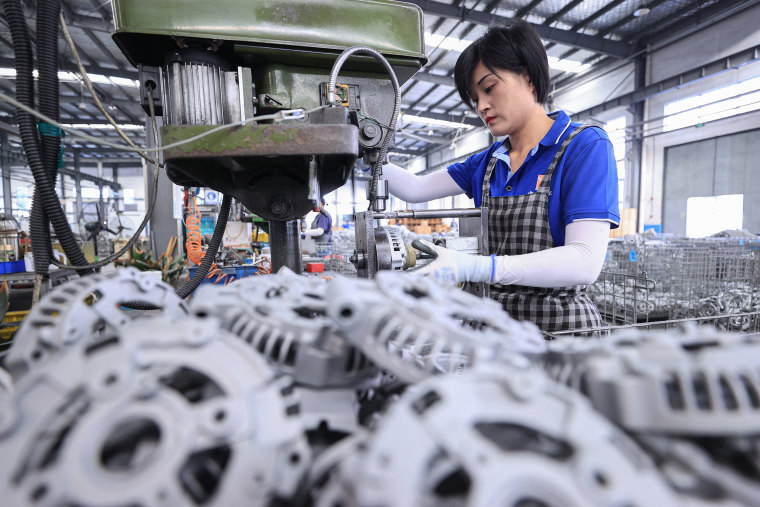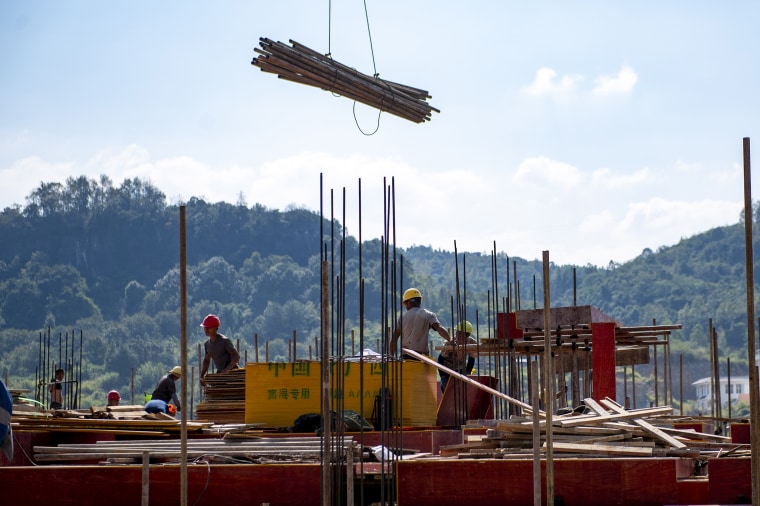China's economic woes have given its markets a week to forget and its public little cause for optimism
BEIJING – A wave of optimism swept Chinese markets recently when Beijing announced a stimulus package that many hoped would pave the way for a wave of investment to help the recovery of the world's second-largest economy.
Traders rushed to buy Chinese stocks, sending the top Shanghai and Hong Kong indexes higher.
But the measures announced this week by Beijing's economic planning agency proved to be an anticlimax — the trillion yuan that observers had hoped would be released never materialized. Investors were disappointed to say the least: Hong Kong's Hang Seng index suffered its worst daily decline in 16 years and Shanghai's CSI 300 closed for the first time in 11 days.
The slowdown comes against a dismal economic backdrop for China, which is still struggling to recover from the Covid-19 pandemic and is plagued by inflation and a sluggish property market. This year, youth unemployment reached a record high of 18.8%. Beijing may even miss its annual growth target of 5% — a figure it often exceeded before the pandemic.
Beijing told a news conference on Tuesday that it was “confident” it would meet its economic targets, a message echoed by Chinese President Xi Jinping, who aims to turn around his flagging economy. Late last month, he described China as “well prepared” to overcome “potential threats” to his country's prosperity.
But while Chinese officials project confidence, markets and the country's public seem less convinced.
“Beijing is signaling to the market that there will be more stimulus ahead, but it will be measured and it will be phased,” said Ku Jin, an associate professor at the London School of Economics and author of “The New China Playbook.” “
The Communist Party has good reason to approach the situation with caution. In 2021, the collapse of China's real estate sector just as the country began to lift its pandemic restrictions sent shockwaves through the economy. For many Chinese people, property is where they put their savings, and for ordinary homebuyers the write-off was brutal.
China's economic slowdown comes at a time when, diplomatically and militarily, it finds itself locked in a fierce rivalry with the United States and its allies, and the trade war that began with the Trump administration has only persisted under President Joe Biden. Beijing will hardly welcome its widespread financial lethargy and this week's market volatility.
But what do this week's events mean for ordinary Chinese citizens? For Fu, a 24-year-old graduate student in Beijing, this month's paroxysms don't change much on the ground. “The Chinese people's money is not really in the stock market. They like savings,” said Beijing-based Fu, who declined to give his first name for fear of backlash for criticizing government policies.

Some of those who jump into the stock market have been vocal about the rising index in recent weeks, with Chinese social media users reacting enthusiastically. Even so, “they just want to hustle and make quick money,” said Miao Yuqing, a retired 50-year-old professional businessman in Beijing.
“Most of them didn't understand the market,” Miao added, adding that ultimately “the market is very opaque … so in the end it's only the elite making money.”
More likely to affect regular citizens are the raft of measures announced on September 24 that include lowering rates, making borrowing easier and freeing commercial banks from holding large reserves. China also announced a new draft law on Friday aimed at revitalizing its private sector.
Economists say Beijing has more stimulus up its sleeve.
“What China needs is structural reforms,” said Alicia Garcia-Herrero, Asia Pacific chief economist at Natixis, pointing to larger pension and unemployment benefits. “I think they will announce something about this.”

Domestic stimulus aside, there are external signs that China's economy is in trouble. In August, Beijing entered into an agreement with Washington to cooperate on future financial stability. This is a far cry from the long-running geopolitical rivalry in which the world's economic superpowers are locked.
Zheng Shanji, chairman of China's National Development and Reform Commission, said on Tuesday that China was “absolutely confident” of achieving its full-year growth target of 5%.
That goal may be a bit optimistic for some analysts. Yu Su, chief economist at the Economist Intelligence Unit, said his team was maintaining the 4.7% annualized forecast for 2024, as the aid injection would take time to translate into “robust” economic activity.
“It is clear that the government does not want to exhaust its policy tools too quickly,” Su said in a note, adding that the government “may announce more support to stimulate the real economy, recapitalize banks and stabilize the property market.”

